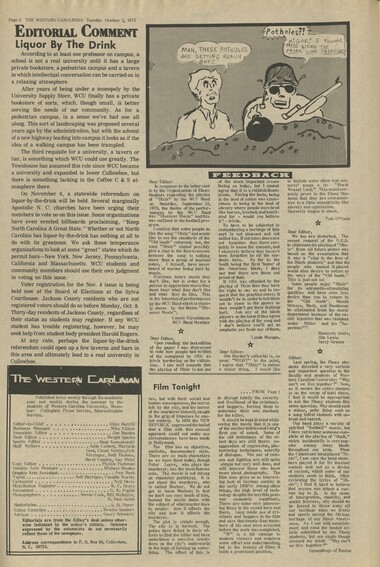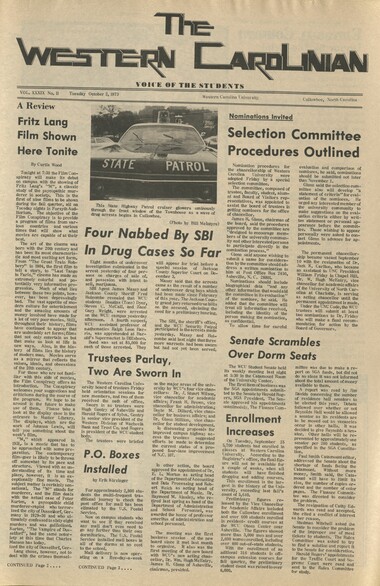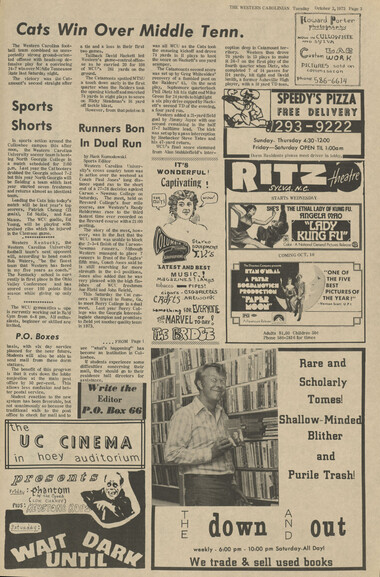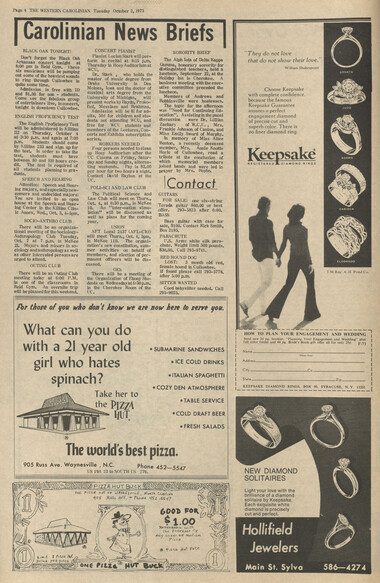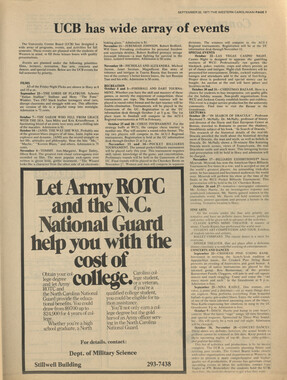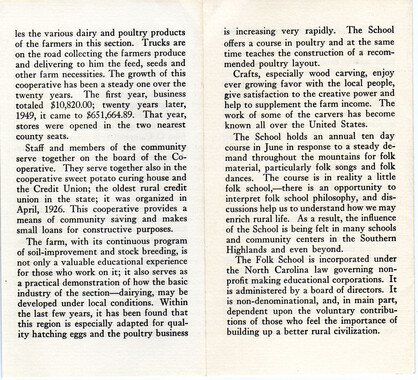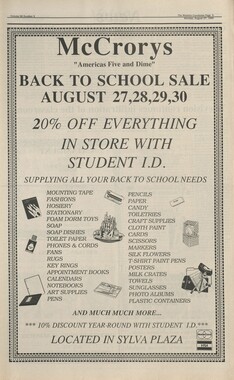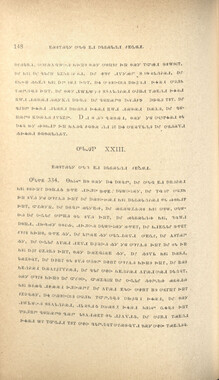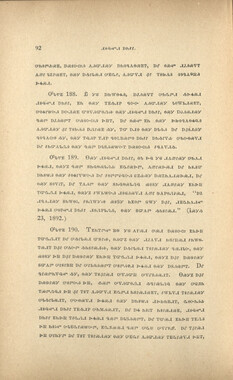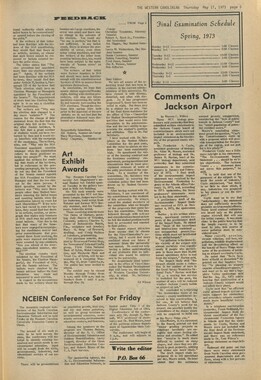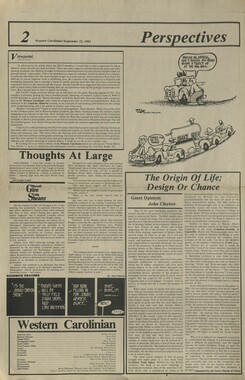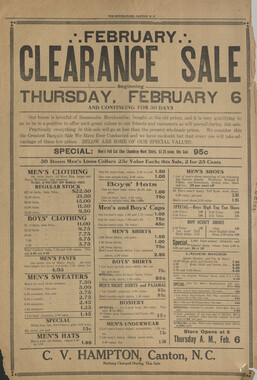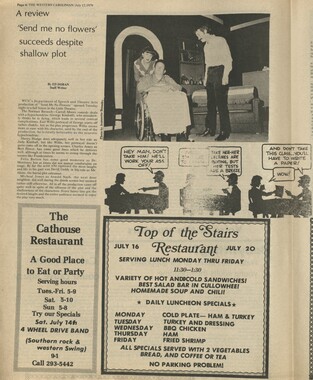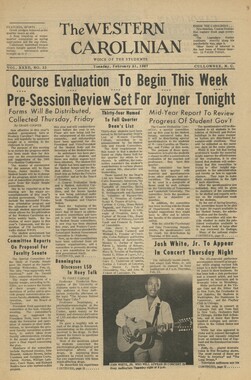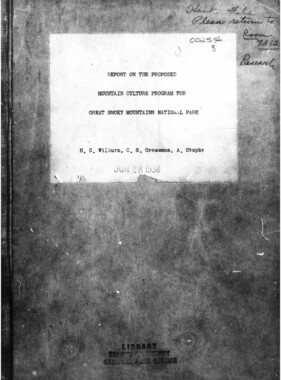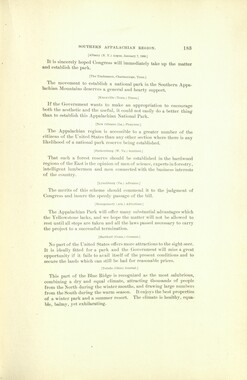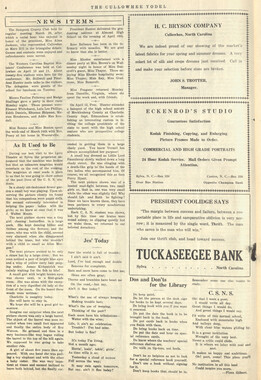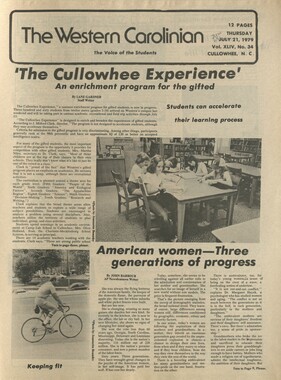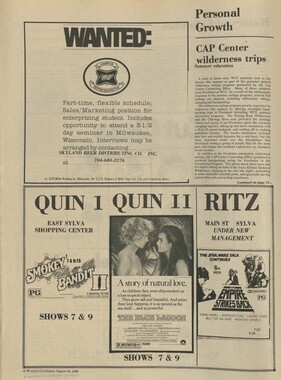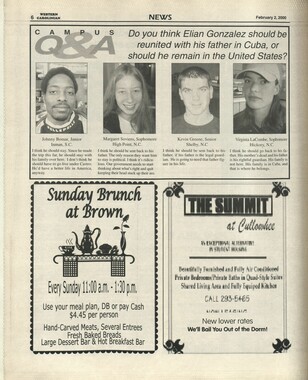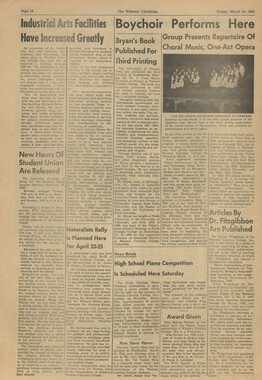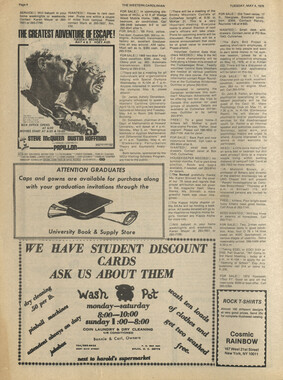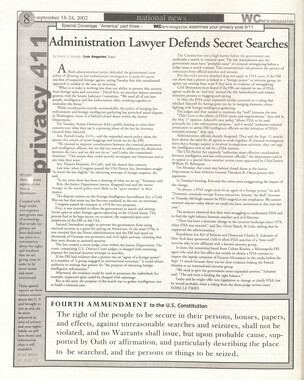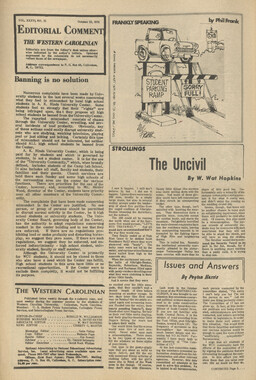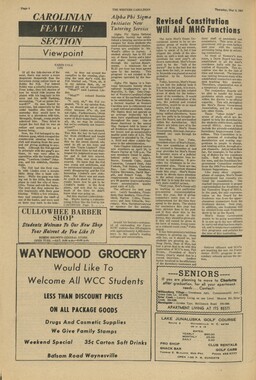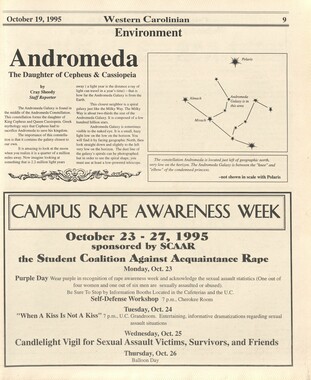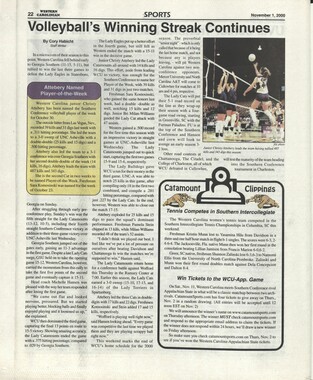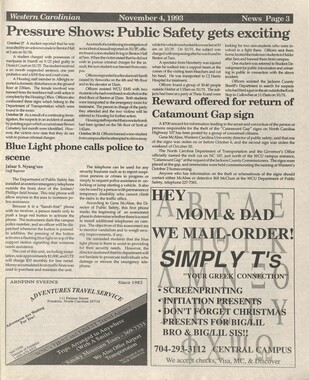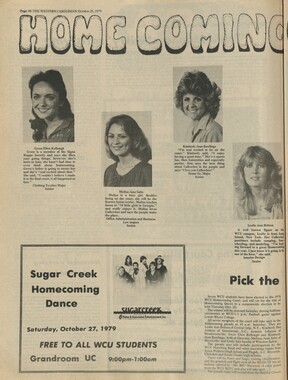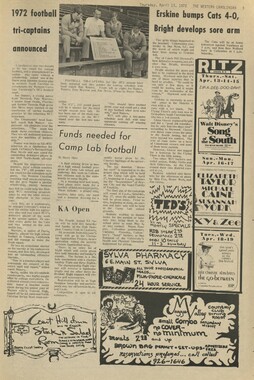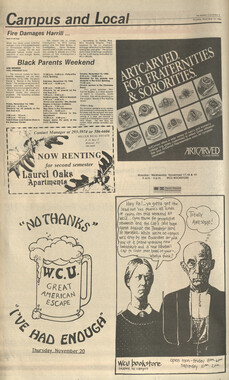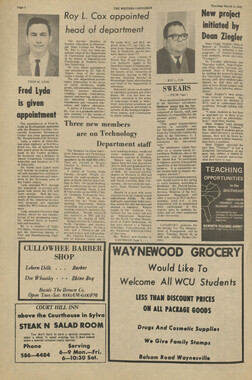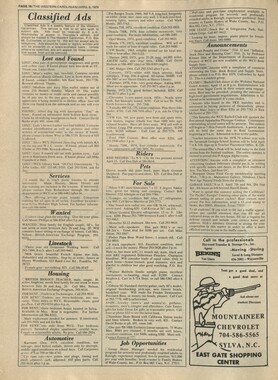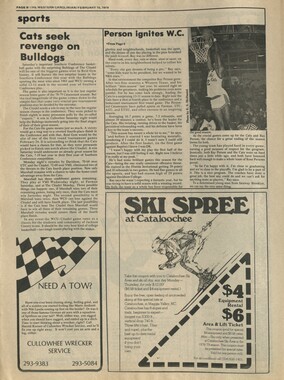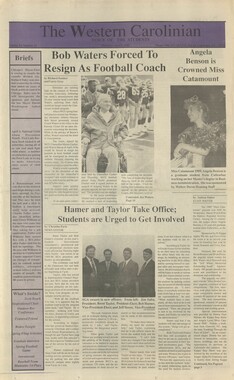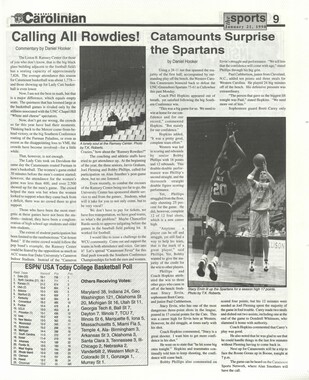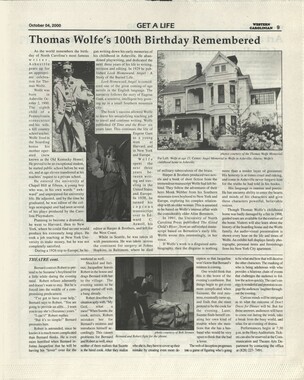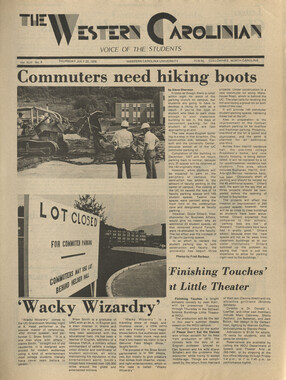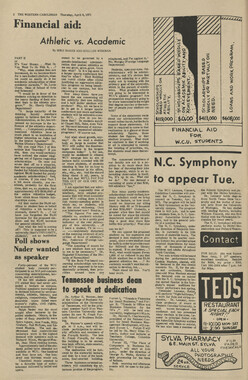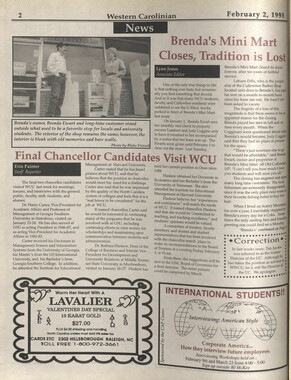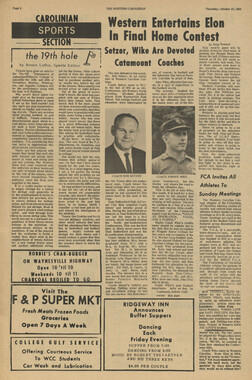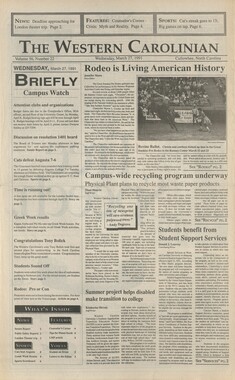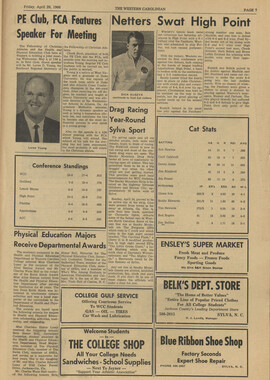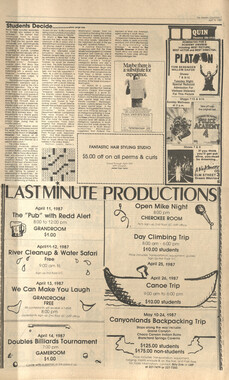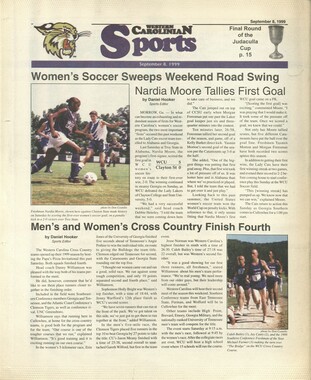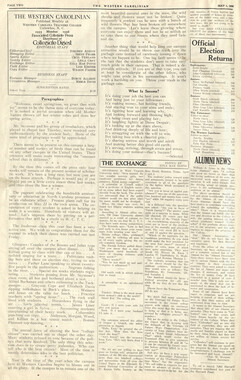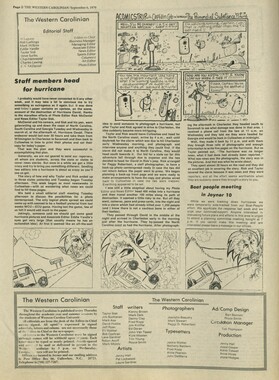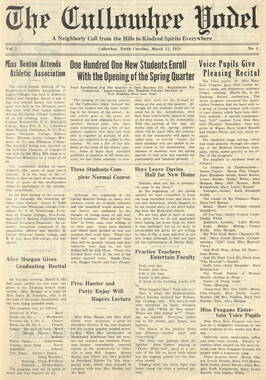Western Carolina University (20)
View all
- Canton Champion Fibre Company (2308)
- Cherokee Traditions (292)
- Civil War in Southern Appalachia (165)
- Craft Revival (1942)
- Great Smoky Mountains - A Park for America (2766)
- Highlights from Western Carolina University (430)
- Horace Kephart (941)
- Journeys Through Jackson (154)
- LGBTQIA+ Archive of Jackson County (85)
- Oral Histories of Western North Carolina (314)
- Picturing Appalachia (6772)
- Stories of Mountain Folk (413)
- Travel Western North Carolina (160)
- Western Carolina University Fine Art Museum Vitreograph Collection (129)
- Western Carolina University Herbarium (92)
- Western Carolina University: Making Memories (708)
- Western Carolina University Publications (2283)
- Western Carolina University Restricted Electronic Theses and Dissertations (146)
- Western North Carolina Regional Maps (71)
- World War II in Southern Appalachia (131)
University of North Carolina Asheville (6)
View all
- Western Carolina College (199)
- Western Carolina Teachers College (239)
- Western Carolina University (1792)
- Allanstand Cottage Industries (0)
- Appalachian National Park Association (0)
- Bennett, Kelly, 1890-1974 (0)
- Berry, Walter (0)
- Brasstown Carvers (0)
- Cain, Doreyl Ammons (0)
- Carver, George Washington, 1864?-1943 (0)
- Cathey, Joseph, 1803-1874 (0)
- Champion Fibre Company (0)
- Champion Paper and Fibre Company (0)
- Cherokee Indian Fair Association (0)
- Cherokee Language Program (0)
- Crittenden, Lorraine (0)
- Crowe, Amanda (0)
- Edmonston, Thomas Benton, 1842-1907 (0)
- Ensley, A. L. (Abraham Lincoln), 1865-1948 (0)
- Fromer, Irving Rhodes, 1913-1994 (0)
- George Butz (BFS 1907) (0)
- Goodrich, Frances Louisa (0)
- Grant, George Alexander, 1891-1964 (0)
- Heard, Marian Gladys (0)
- Kephart, Calvin, 1883-1969 (0)
- Kephart, Horace, 1862-1931 (0)
- Kephart, Laura, 1862-1954 (0)
- Laney, Gideon Thomas, 1889-1976 (0)
- Masa, George, 1881-1933 (0)
- McElhinney, William Julian, 1896-1953 (0)
- Niggli, Josephina, 1910-1983 (0)
- North Carolina Park Commission (0)
- Osborne, Kezia Stradley (0)
- Owens, Samuel Robert, 1918-1995 (0)
- Penland Weavers and Potters (0)
- Rhodes, Judy (0)
- Roberts, Vivienne (0)
- Roth, Albert, 1890-1974 (0)
- Schenck, Carl Alwin, 1868-1955 (0)
- Sherrill's Photography Studio (0)
- Smith, Edward Clark (0)
- Southern Highland Handicraft Guild (0)
- Southern Highlanders, Inc. (0)
- Stalcup, Jesse Bryson (0)
- Stearns, I. K. (0)
- Thompson, James Edward, 1880-1976 (0)
- United States. Indian Arts and Crafts Board (0)
- USFS (0)
- Vance, Zebulon Baird, 1830-1894 (0)
- Weaver, Zebulon, 1872-1948 (0)
- Western Carolina University. Mountain Heritage Center (0)
- Whitman, Walt, 1819-1892 (0)
- Wilburn, Hiram Coleman, 1880-1967 (0)
- Williams, Isadora (0)
- 1920s (57)
- 1930s (69)
- 1940s (114)
- 1950s (66)
- 1960s (314)
- 1970s (599)
- 1980s (406)
- 1990s (379)
- 2000s (195)
- 2010s (83)
- 1600s (0)
- 1700s (0)
- 1800s (0)
- 1810s (0)
- 1820s (0)
- 1830s (0)
- 1840s (0)
- 1850s (0)
- 1860s (0)
- 1870s (0)
- 1880s (0)
- 1890s (0)
- 1900s (0)
- 1910s (0)
- 2020s (0)
- Jackson County (N.C.) (2282)
- Appalachian Region, Southern (0)
- Asheville (N.C.) (0)
- Avery County (N.C.) (0)
- Blount County (Tenn.) (0)
- Buncombe County (N.C.) (0)
- Cherokee County (N.C.) (0)
- Clay County (N.C.) (0)
- Graham County (N.C.) (0)
- Great Smoky Mountains National Park (N.C. and Tenn.) (0)
- Haywood County (N.C.) (0)
- Henderson County (N.C.) (0)
- Knox County (Tenn.) (0)
- Knoxville (Tenn.) (0)
- Lake Santeetlah (N.C.) (0)
- Macon County (N.C.) (0)
- Madison County (N.C.) (0)
- McDowell County (N.C.) (0)
- Mitchell County (N.C.) (0)
- Polk County (N.C.) (0)
- Qualla Boundary (0)
- Rutherford County (N.C.) (0)
- Swain County (N.C.) (0)
- Transylvania County (N.C.) (0)
- Watauga County (N.C.) (0)
- Waynesville (N.C.) (0)
- Yancey County (N.C.) (0)
- Newsletters (510)
- Publications (documents) (1773)
- Aerial Photographs (0)
- Aerial Views (0)
- Albums (books) (0)
- Articles (0)
- Artifacts (object Genre) (0)
- Bibliographies (0)
- Biography (general Genre) (0)
- Cards (information Artifacts) (0)
- Clippings (information Artifacts) (0)
- Crafts (art Genres) (0)
- Depictions (visual Works) (0)
- Design Drawings (0)
- Drawings (visual Works) (0)
- Envelopes (0)
- Facsimiles (reproductions) (0)
- Fiction (general Genre) (0)
- Financial Records (0)
- Fliers (printed Matter) (0)
- Glass Plate Negatives (0)
- Guidebooks (0)
- Internegatives (0)
- Interviews (0)
- Land Surveys (0)
- Letters (correspondence) (0)
- Manuscripts (documents) (0)
- Maps (documents) (0)
- Memorandums (0)
- Minutes (administrative Records) (0)
- Negatives (photographs) (0)
- Newspapers (0)
- Occupation Currency (0)
- Paintings (visual Works) (0)
- Pen And Ink Drawings (0)
- Periodicals (0)
- Personal Narratives (0)
- Photographs (0)
- Plans (maps) (0)
- Poetry (0)
- Portraits (0)
- Postcards (0)
- Programs (documents) (0)
- Questionnaires (0)
- Scrapbooks (0)
- Sheet Music (0)
- Slides (photographs) (0)
- Songs (musical Compositions) (0)
- Sound Recordings (0)
- Specimens (0)
- Speeches (documents) (0)
- Text Messages (0)
- Tintypes (photographs) (0)
- Transcripts (0)
- Video Recordings (physical Artifacts) (0)
- Vitreographs (0)
- The Reporter, Western Carolina University (510)
- WCU Students Newspapers Collection (1744)
- A.L. Ensley Collection (0)
- Appalachian Industrial School Records (0)
- Appalachian National Park Association Records (0)
- Axley-Meroney Collection (0)
- Bayard Wootten Photograph Collection (0)
- Bethel Rural Community Organization Collection (0)
- Blumer Collection (0)
- C.W. Slagle Collection (0)
- Canton Area Historical Museum (0)
- Carlos C. Campbell Collection (0)
- Cataloochee History Project (0)
- Cherokee Studies Collection (0)
- Daisy Dame Photograph Album (0)
- Daniel Boone VI Collection (0)
- Doris Ulmann Photograph Collection (0)
- Elizabeth H. Lasley Collection (0)
- Elizabeth Woolworth Szold Fleharty Collection (0)
- Frank Fry Collection (0)
- George Masa Collection (0)
- Gideon Laney Collection (0)
- Hazel Scarborough Collection (0)
- Hiram C. Wilburn Papers (0)
- Historic Photographs Collection (0)
- Horace Kephart Collection (0)
- Humbard Collection (0)
- Hunter and Weaver Families Collection (0)
- I. D. Blumenthal Collection (0)
- Isadora Williams Collection (0)
- Jesse Bryson Stalcup Collection (0)
- Jim Thompson Collection (0)
- John B. Battle Collection (0)
- John C. Campbell Folk School Records (0)
- John Parris Collection (0)
- Judaculla Rock project (0)
- Kelly Bennett Collection (0)
- Love Family Papers (0)
- Major Wiley Parris Civil War Letters (0)
- Map Collection (0)
- McFee-Misemer Civil War Letters (0)
- Mountain Heritage Center Collection (0)
- Norburn - Robertson - Thomson Families Collection (0)
- Pauline Hood Collection (0)
- Pre-Guild Collection (0)
- Qualla Arts and Crafts Mutual Collection (0)
- R.A. Romanes Collection (0)
- Rosser H. Taylor Collection (0)
- Samuel Robert Owens Collection (0)
- Sara Madison Collection (0)
- Sherrill Studio Photo Collection (0)
- Smoky Mountains Hiking Club Collection (0)
- Stories of Mountain Folk - Radio Programs (0)
- Venoy and Elizabeth Reed Collection (0)
- WCU Gender and Sexuality Oral History Project (0)
- WCU Mountain Heritage Center Oral Histories (0)
- WCU Oral History Collection - Mountain People, Mountain Lives (0)
- Western North Carolina Tomorrow Black Oral History Project (0)
- William Williams Stringfield Collection (0)
- Zebulon Weaver Collection (0)
- College student newspapers and periodicals (1769)
- African Americans (0)
- Appalachian Trail (0)
- Artisans (0)
- Cherokee art (0)
- Cherokee artists -- North Carolina (0)
- Cherokee language (0)
- Cherokee pottery (0)
- Cherokee women (0)
- Church buildings (0)
- Civilian Conservation Corps (U.S.) (0)
- Dams (0)
- Dance (0)
- Education (0)
- Floods (0)
- Folk music (0)
- Forced removal, 1813-1903 (0)
- Forest conservation (0)
- Forests and forestry (0)
- Gender nonconformity (0)
- Great Smoky Mountains National Park (N.C. and Tenn.) (0)
- Hunting (0)
- Landscape photography (0)
- Logging (0)
- Maps (0)
- Mines and mineral resources (0)
- North Carolina -- Maps (0)
- Paper industry (0)
- Postcards (0)
- Pottery (0)
- Railroad trains (0)
- Rural electrification -- North Carolina, Western (0)
- School integration -- Southern States (0)
- Segregation -- North Carolina, Western (0)
- Slavery (0)
- Sports (0)
- Storytelling (0)
- Waterfalls -- Great Smoky Mountains (N.C. and Tenn.) (0)
- Weaving -- Appalachian Region, Southern (0)
- Wood-carving -- Appalachian Region, Southern (0)
- World War, 1939-1945 (0)
- Text (2283)
- MovingImage (0)
- Sound (0)
- StillImage (0)
Western Carolinian Volume 39 Number 11
Item
Item’s are ‘child’ level descriptions to ‘parent’ objects, (e.g. one page of a whole book).
-
-
Page 2 THE WESTERN CAROLINIAN Tuesday October 2, 1973 Editorial Comment Liquor By The Drink According to at least one professor on campus, a school is not a real university until it has a large private bookstore, a pedestrian campus and a tavern in which intellectual conversation can be carried on in a relaxing atmosphere. After years of being under a monopoly by the University Supply Store, WCU finally has a private bookstore of sorts, which, though small, is better serving the needs of our community. As for a pedestrian campus, in a sense we've had one all along. This sort of landscaping was proposed several years ago by the administration, but with the advent of a new highway leading into campus it looks as if the idea of a walking campus has been trampled. The third requisite for a university, a tavern or bar, is something which WCU could use greatly. The Townhouse has assumed this role since WCC became a university and expanded to lower Cullowhee, but there is something lacking in the Coffee C & S atmosphere there. On November 6, a statewide referendum on liquor-by-the-drink will be held. Several marginally Apostolic N. C. churches have been urging their members to vote no on this issue. Some organizations have even erected billboards proclaiming, "Keep North Carolina A Great State." Whether or not North Carolina has liquor-by-the-drink has nothing at all to do with its greatness. We ask these temperance organizations to look at some "great" states which do permit bars—New York, New Jersey, Pennsylvania, California and Massachusetts. WCU students and community members should use their own judgment in voting on this issue. Voter registration for the Nov. 6 issue is being held now at the Board of Elections at the Sylva Courthouse. Jackson County residents who are not registered voters should do so before Monday, Oct. 8. Thirty-day residents of Jackson County, regardless of their status as students may register. If any WCU student has trouble registering, however, he may seek help from student body president Harold Rogers. At any rate, perhaps the liquor-by-the-drink referendum could open up a few taverns and bars in this area and ultimately lead to a real university in Cullowhee. The- Wi=sTi=*^i QAqnLiMwUu Published twics weekly through the academic year and weekly during the summer by the students of Western Carolina University. Member: Collegiate Press Service, Intercollegiate Service. Editor-in-Chief Alice Harrill Business Manager Mike Killam Associate Editor . . . . Jim Barden Desk Editor Dwight Sparks Sports Editor Hank Komodowski Staff Writers . . Julia Corbett, Marlicia Gout, Chuck Kirtley,Erik Kirzinger, Beth Thomas, David Venable, Gay White Copy Editor . . . . Phyllis Pechman Graphic Arts Manager ............... Michael Rhodes Graphic Arts Assistant. ................... Amy Beck Typist Judi Harriger, Claudia Worley Cartoonist . . . . . Neil Davis Distribution Engineer . . . . ............. W. C. Drury Accountant . . . . . . G. W. Poplin Photographers . Steven Cook, Bill Mclntyres R. Paul Smith Statistician. S. D. Pharr Editor Emeritus Brooks Sanders Advisor Gerry Schwartz Editorials are from the Editor's desk unless otherwise indicated by toe author's initials. Opinions expressed by toe columnists do not necessarUy reflect those of toe newspaper. Address correspondence to P. 0. Box 66, Cullowhee, N.C. 28723. Dear Editor: In response to the letter sent in by the Organization of Ebony Students regarding the playing of "Dixie" by the WCU Band on Saturday; September 22s 1973, the theme of the performances by the WCU Band was "Discover Music" and this was outlined in the football program. I realize that some people do like the song "Dixie" and would like to see the standards of the "Old South" returned; but, the song "Dixie" cannot possibly give a slap in the facetoanyone because the song is nothing more than a group of musical notes. I myself, have never heard of anyone being hurt by music. Everyone hears music they don't like, but in order for a person to appreciate music they must hear what they don't like and what they do like. This is the intention of performances by the WCU Band which is clearly shown by the theme "Discover Music". Connie Kirschbaum WCU Band Member Dear Editor, Upon reading the lastedition of the paper I was distressed to note how people had written of the complaint by OES as trivia bordering on the ridiculous. I can well concede that the playing of Dixie is not one of the more important issues facing us today, but I cannot agree that it is a childish fanaticism. Facing the facts, being in the land of cotton was synonymous to being in the land of slavery where people were bred like horses, lynched, and humil- ated for - would you believe it? - trivia. To have to be subjected to remembering a heritage of this sort is not pleasant and not called for. If old times there are not forgotten then there certainly Is cause for concern, and I sincerely believe they haven't been forgotten by all the students here. As far as the South being the first 'home' of toe American black, I dare say that there are those not proud of that. If OES was offended by the playing of Dixie then thay have the right to say so and to request that the practice cease; it wouldn't be in order to tell them not to come to the games so they wouldn't get their feelings hurt. Ask any of the black players on the team if they agree with the playing of the song and I don't believe you'll get an emphatic yes from any of them. Lynda Morgan. Dear Editor: Jim Barden's editorial is, as usual "RIGHT" to the point. I agree that "Dixie" is rather a minor thing,, 1 would like Film Tonight ves, but with their social and human consequences, the terror felt by the city, and the terror of the murderer himself, caught in the grip of impulses he cannot control. In 1933 the NEW REPUBLIC expressed the belief that a film with this unusual approach could not under any circumstances have been made in Hollywood. The film has an objective, realistic, documentary style. There are no main characters as we know them today, though Peter Lorre, who plays the murderer, has the most famous role. The movie Is not strong on character portrayal. It is not about the murderer, who is called Becker. We do not get to know Becker; in fact we don't see very much of him. Instead the movie deals with the subject of what murder does to people: how it affects the city and how it affects the murderer. The plot is simple enough. The city is in turmoil. The police have failed in their efforts to find the killer and have undertaken a massive crackdown on the city's underworld in the hope of turning up something. The effect of this is .... FROM Page 1 to disrupt totally the security and livelihood of the criminals and beggars, forcing them to undertake their own manhunt for the killer. It should be kept in mind while seeing the movie that it is one of the earlier talkies and Lang's first use of sound. Some of toe old techniques of the silent days are still there: exaggeration of expression, pantomiming techniques, scarcity of dialogue. The use of camera and lighting are still quite simple but very well done, and will interest those who know more about photography. The film also gives us an interesting look at German society in the early 1930's: among other things, the high level of technology despite the terrible postwar economic conditions. There are some very interesting faces in the crowd here and there. Lang made use of criminals and beggars in the film and says that twenty-four members of his cast were arrested before the work was completed. "M" is a bit strange to modern viewers and requires some effort and understanding, but in the history of films it holds a prominent position. to include some other lost cultures' songs - le: "Horst Wessel Lied." This would certainly prove to the Ebony Students that they are oversensitive to a little eccentricity like slavery and oppression. Sincerely tongue in cheek9 Tom O'Toole Dear Editor, We too are disturbed. The recent request of the O.E.S. to eliminate the playing of'' Dixie" from all future games was based on the assumption that it was a "slap in the face of the Black students" and that the people who wanted it played would also desire to return to the ways of the "Old South." This is just not so! Some people enjoy "Dixie" for its adrenalin-stimulating qualities and have even less desire than you to return to the "Old South". Should Strauss, Bachf and Beethoven be eliminated from the music department because of the racial injustice that was rampant under Hitler and his "Supermen"? Sincerely yours, Jim Lewis Jerry Greene Editor: Last spring, the Ebony students directed a very serious and important question to the faculty and students of Western Carolina University: "Why can't we live together?" Now, as it seems the entire campus is on the verge of total chaos, I feel it would be appropriate to ask the Ebony students this same question. Why should such a minor, petty thing such as a song infest students with un- trust and hatred. Our band plays a variety of spirited "football" music, but I have yet to hear someone complain at the playing of "Shaft," which incidentally is very popular among many bands throughout our area. When the Catamount band played "Dixie", I am sure the band members played it for its musical content and not as a device of racism, which some of our students seem to think. After reviewing the lyrics of "Dixie", I find it hard to believe that anyone can attach a racism tag to it. In the name of intergration, equality, and social fairness, why should we be forced to throw away all our heritage when we freely and openly accept the African heritage of our Black Americans. As I sat with astonishment and read the heated article submitted by the Ebony students, but one single though crossed my mind: "Why can't we live together?" Groundhogs of Benton
Object
Object’s are ‘parent’ level descriptions to ‘children’ items, (e.g. a book with pages).
-
The Western Carolinian is Western Carolina University's student-run newspaper. The paper was published as the Culowhee Yodel from 1924 to 1931 before changing its name to The Western Carolinian in 1933.
-
